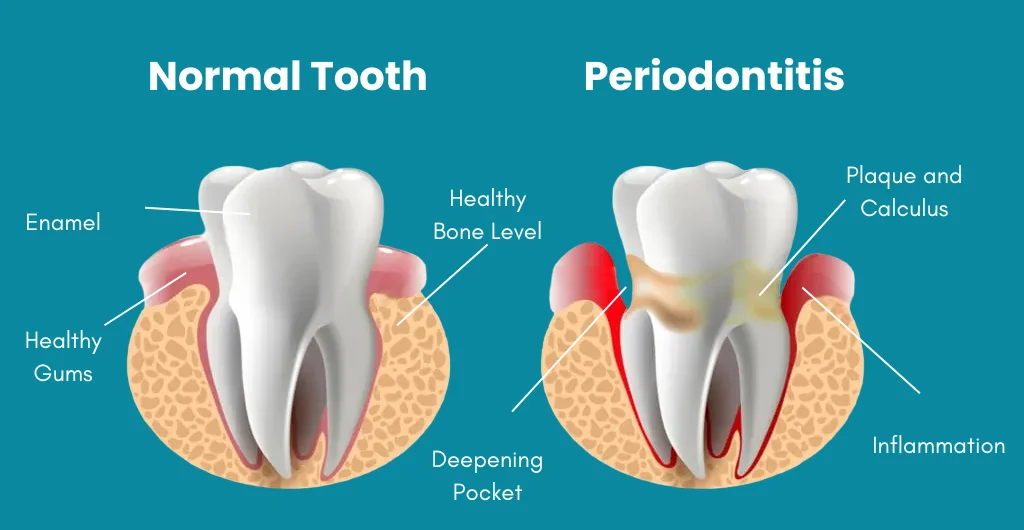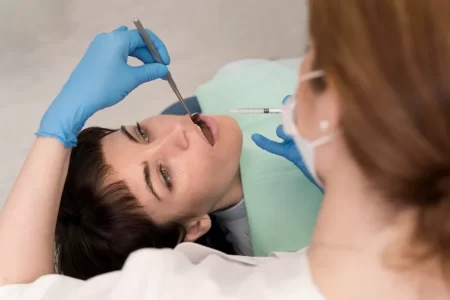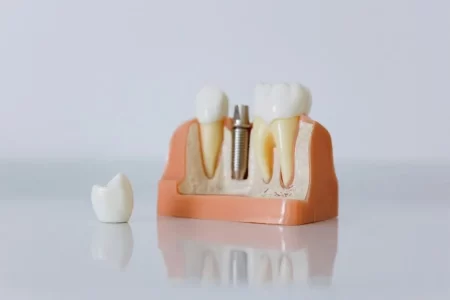Loose Tooth & Pain in Adults
- Updated on: Aug 3, 2024
- 4 min Read
- Published on Oct 3, 2019


I have a loose tooth: What does it mean in adults?
Loose teeth are very common in children. But loose permanent teeth in adults are a major concern because it may indicate some problems with the bone or ligaments securing the teeth in place.
Loose teeth can be slightly loose or persistently loose which may require immediate attention. If left untreated, the major complication that is faced by the patient is tooth loss.
Slightly Loose Tooth in Adults
Sometimes, a small injury may affect the tooth and make it slightly loose. Such cases usually heal within days and the teeth tighten up on its own without much intervention from patient’s side. But still, there are certain things which should be taken care of. The patient should:
- Avoid chewing or biting with that tooth
- Stick to soft foods for a few days
- Not wiggle it or try to move it around
If, after a few days, the wobbly adult tooth hasn’t tightened into place on its own, then it is necessary to see the dentist in order to check whether the injury has affected the tooth in a serious way.
More: Tooth Loss (Edentulism): Causes, Prevention, Complications, Treatment
More: Missing tooth replacement options
Persistently loose tooth
If the tooth has been loose for a long period of time, the patient should immediately consult the situation with his dentist. A persistently loose tooth can be caused because of many reasons such as discussed herein.
Causes of a persistently loose teeth
Periodontal Disease

Gum disease affects the gums, ligaments and the bone surrounding the teeth. Such diseases usually start with an inflammation. The inflammation can cause major damage to the tissues around the teeth. If the condition continues for a certain period of time, the tooth may become loose. A loose tooth is also accompanied with:
- Pain
- Difficulty with chewing
Osteoporosis and Bisphosphonates
Osteoporosis increases the risk of bone fractures, especially of the spine, wrists and hips. It also weakens the bone surrounding the teeth. This may cause loose teeth.
Bisphosphonates are often used to treat osteoporosis and similar other conditions. Generally, they are safe but in rare cases, they can lead to a serious condition called osteonecrosis of the jaw (occurs when jaw bone is exposed and begin to starve from a lack of blood).
The symptoms of this condition are:
- loose teeth
- Intense pain
Traumatic Forces and Injuries
Chewing food with misaligned teeth, grinding or clenching the teeth are some mechanical forces that can stretch the ligaments surrounding the teeth. Eventually, it may lead to loosening of teeth.
Injuries to the face can also loosen ligaments. Some injuries even fracture the bone around the teeth, resulting in loose teeth. Any such injury should be immediately assessed by a doctor and dentist.
Effects of Pregnancy
During pregnancy, a female body undergoes many changes. Some changes can temporarily loosen the ligaments supporting the teeth.
More: Dental Glue or Dental Cement for Teeth.
Very loose or knocked out tooth
Persistently loose tooth if left untreated can lead to very loose, almost falling out, chipped, fractured, or permanent tooth knocked loose. It is called dental emergency and the patient should immediately see a dentist within next couple of hours.
If the tooth has fallen out, then to save the tooth, it must be placed in its socket as soon as possible. According to doctors, 2 hours is the limit for tooth survival. There are certain first aid steps that can be followed by the patient herself/himself before he could meet the dentist:
- Rinse off the tooth with water. Try not to scrub the tooth.
- Replace it in the socket in the correct position and in the correct way.
- Press the thumb on the tooth until the crown is level with the adjacent teeth.
- Place a wad of cloth between the jaws on the tooth to stabilize it till dentist is there to assist you.
If the tooth is not placed back in its socket, it is very important to keep the tooth moist. Do not let it dry out. The tooth can be placed in saliva or milk.
Losing a permanent tooth is preventable if right steps are taken at the right time.
Loose tooth adults treatment (Remedy for loose teeth in adults)
Can you save a loose tooth in adults? Yes, there are a few ways to treat loose teeth:
Splinting
Splinting is one of the important methods for shaking teeth treatment. A loose tooth can be easily stabilized if a splint is attached to its surface. The splint is also bonded to the stable teeth nearby. If the tooth is kept in place for some time, the stretched periodontal ligaments (which normally cause loose teeth) can be healed and tighten. Thus, it will eventually tighten the tooth.
Splinting is also a loose front tooth solution. It is also used in case of loose bottom tooth.
Occlusal night guard
Occlusal night guard is a remedy for loose teeth in adults. This guard is suggested for people who grind their teeth at night. The night guard prevents the strain of grinding teeth and also avoids further injury. Read about teeth grinding.
Deep cleaning
Deep cleaning is required for gum diseases. It is done to remove pockets of bacteria and infection between the teeth and gum and below the gum line.
Dentures, bridges and implants
In case the wiggly tooth cannot be saved from falling out, missing teeth are replaced with dentures, bridges and implants.
Read more about loose tooth treatment and missing tooth replacement options.
Why treat a loose tooth?
There are a number of reasons to treat loose teeth, including:
- To give more confidence in the strength of smile and teeth
- To help prevent tooth loss
- To make eating and talking much easier and less painful
- To prevent some issues that may be caused by a tooth and or gum infection
How to deal with the loose tooth pain in adults?
Loose tooth is always accompanied with pain whose severity depends on the degree with which the tooth is loose. Pain can be managed by following certain tips:
- Put two drops of clove oil on a cotton ball and place it against the tooth itself until the pain decreases. Cloves are a traditional remedy for numbing nerves and thus relieve pain.
- A teaspoon of salt mixed in a cup of boiling water makes a pain-killing mouthwash.
- Place a small ice cube in a plastic bag, wrap a thin cloth around the bag, and apply it to the aching tooth for about 15 minutes to numb the nerves.











